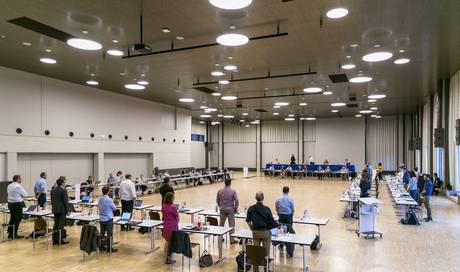In the run-up to the new municipal code, two suggestions from municipal councils had sparked discussion: on the one hand, that once they came into force, the population would no longer be able to vote on loans exceeding four million francs; or contain an annual recurring amount of more than 400,000 francs. On the other hand, that in the future only budgets with tax rate changes would have come to the polls.
However, a large majority of the residents’ council wants those entitled to vote to continue to vote on all budgets: 29 voted in favor, 18 agreed with the suggestion of the municipal council. The residents’ council also maintained the mandatory referendum for loans over CHF 4 million with a large majority.
With the abolition of the mandatory referendum, the municipal council wanted to strengthen the back of the residents’ council in the future. But the proposals were largely not well received, “even if we welcome fundamentally innovative ideas and the intention to strengthen the residents’ council,” said FDP parliamentary group leader Judith Gähler in her vote. But this would come at an inopportune time. It sounded similar with other groups.
One who would have welcomed these changes is residents’ councilor Leo Scherer – and with him his parliamentary group SP / WettiGrüen. “This is a highly political question: what is democracy anyway? Only when the population votes? ”He asked the group. The residents’ council is also a body elected by the people, like the municipal council. It is an oversimplification when democracy is only when the people decide. “For me, democracy means conducting an informed discussion and discussion.”
But the large majority in parliament did not decide in his favor. This means that the population can continue to vote on all budgets and loans in the future. Although this will have the last word in the new municipal code as soon as the business comes to the polls.
One vote decided the debate about GPK and Fiko
The question of whether the business audit and finance commissions should be merged also led to discussions. There are currently seven people on both bodies. According to the new municipal code, these should be merged into a nine-person commission – in order to be able to better guarantee the representation of parliament or the parliamentary groups.
The SVP, FDP and EPP / Forum 5430 parliamentary groups were in favor of retaining both commissions; CVP, SP / Wetti Grüen and GLP wanted a single commission. In the end, 23 voted for one proposal, 23 for the other. That made a casting vote by residents’ council president Christian Pauli, an FDP member, necessary. He stayed true to the party line. This means that there will continue to be GPK and Fiko in Wettingen.
In addition, the residents’ councils approved the proposal that the new municipal code should come into force for the new legislative period, which begins on January 1, 2022, and not on June 1, 2021 as originally planned.
In the end, shortly before 11 p.m., the amended municipal code was approved by the residents’ council with one abstention. That evening, the revised business regulations of the residents’ council would have been on the agenda. But after last week’s budget meeting, which lasted over 5 hours Christian Pauli ended the session earlier this time. The business regulations will be dealt with at a different time.
– .


